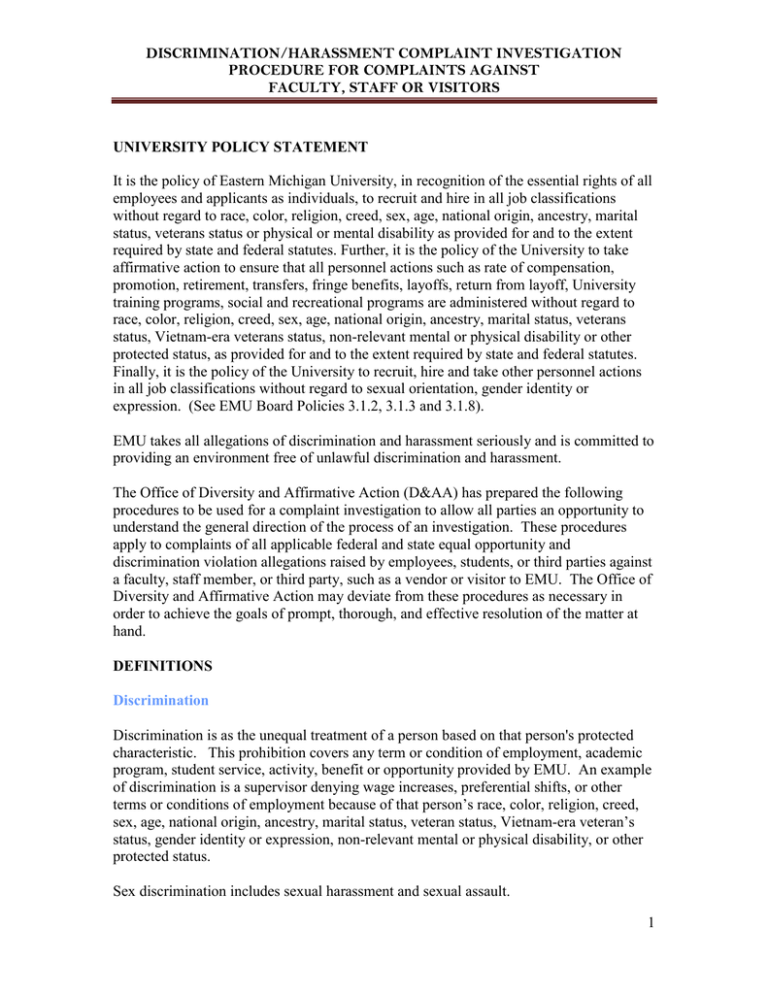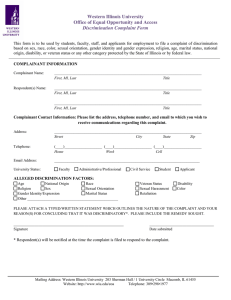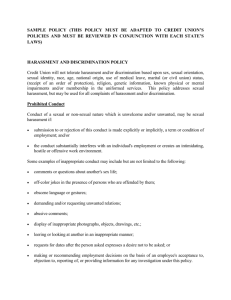
DISCRIMINATION/HARASSMENT COMPLAINT INVESTIGATION
PROCEDURE FOR COMPLAINTS AGAINST
FACULTY, STAFF OR VISITORS
UNIVERSITY POLICY STATEMENT
It is the policy of Eastern Michigan University, in recognition of the essential rights of all
employees and applicants as individuals, to recruit and hire in all job classifications
without regard to race, color, religion, creed, sex, age, national origin, ancestry, marital
status, veterans status or physical or mental disability as provided for and to the extent
required by state and federal statutes. Further, it is the policy of the University to take
affirmative action to ensure that all personnel actions such as rate of compensation,
promotion, retirement, transfers, fringe benefits, layoffs, return from layoff, University
training programs, social and recreational programs are administered without regard to
race, color, religion, creed, sex, age, national origin, ancestry, marital status, veterans
status, Vietnam-era veterans status, non-relevant mental or physical disability or other
protected status, as provided for and to the extent required by state and federal statutes.
Finally, it is the policy of the University to recruit, hire and take other personnel actions
in all job classifications without regard to sexual orientation, gender identity or
expression. (See EMU Board Policies 3.1.2, 3.1.3 and 3.1.8).
EMU takes all allegations of discrimination and harassment seriously and is committed to
providing an environment free of unlawful discrimination and harassment.
The Office of Diversity and Affirmative Action (D&AA) has prepared the following
procedures to be used for a complaint investigation to allow all parties an opportunity to
understand the general direction of the process of an investigation. These procedures
apply to complaints of all applicable federal and state equal opportunity and
discrimination violation allegations raised by employees, students, or third parties against
a faculty, staff member, or third party, such as a vendor or visitor to EMU. The Office of
Diversity and Affirmative Action may deviate from these procedures as necessary in
order to achieve the goals of prompt, thorough, and effective resolution of the matter at
hand.
DEFINITIONS
Discrimination
Discrimination is as the unequal treatment of a person based on that person's protected
characteristic. This prohibition covers any term or condition of employment, academic
program, student service, activity, benefit or opportunity provided by EMU. An example
of discrimination is a supervisor denying wage increases, preferential shifts, or other
terms or conditions of employment because of that person’s race, color, religion, creed,
sex, age, national origin, ancestry, marital status, veteran status, Vietnam-era veteran’s
status, gender identity or expression, non-relevant mental or physical disability, or other
protected status.
Sex discrimination includes sexual harassment and sexual assault.
1
DISCRIMINATION/HARASSMENT COMPLAINT INVESTIGATION
PROCEDURE FOR COMPLAINTS AGAINST
FACULTY, STAFF OR VISITORS
Sexual Harassment
Sexual harassment is defined as unwelcome sexual advances, requests for sexual favors,
and other verbal or physical conduct of a sexual nature when:
Submission to such conduct is made either explicitly or implicitly a term or
condition of instruction, employment, or participation in any University activity;
Submission to or rejection of such conduct by an individual is used as a basis for
evaluation in making academic or personnel decisions affecting an individual;
Such conduct is sufficiently serious that it interferes with or limits an individual’s
ability to participate in or benefit from the employment or educational
environment.
In determining whether the alleged conduct constitutes sexual harassment, consideration
shall be given to the record as a whole and to the totality of circumstances, including the
nature and frequency of the conduct and the context in which the alleged incidents
occurred.
Sexual Assault
The criminal sexual conduct statutes of Michigan define sexual assault as a crime
involving forced or coerced sexual penetration (first and third degree) or sexual contact
(second and fourth degree).
Depending on the particular circumstances, sex discrimination, sexual harassment or
sexual assault may include, but is not limited to, the following:
1. Physical assaults of a sexual nature, such as rape, sexual battery, molestation, or
attempts to commit these assaults; and intentional physical conduct that is sexual
in nature such as touching, pinching, patting, grabbing, poking, or brushing
against another individual's body.
2. Offering or implying an employment-related reward (such as a promotion,
raise, or different work assignment) or an education-related reward (such as a
better grade, a letter of recommendation, favorable treatment in the classroom,
assistance in obtaining employment, grants or fellowships, or admission to any
educational program or activity) in exchange for sexual favors or submission to
sexual conduct.
3. Threatening or taking a negative employment action (such as termination,
demotion, denial of an employee benefit or privilege, or change in working
conditions) or negative educational action (such as giving an unfair grade,
withholding a letter of recommendation, or withholding assistance with any
2
DISCRIMINATION/HARASSMENT COMPLAINT INVESTIGATION
PROCEDURE FOR COMPLAINTS AGAINST
FACULTY, STAFF OR VISITORS
educational activity) or intentionally making the individual's job or academic
work more difficult because sexual conduct is rejected.
4. The use or display in the classroom or workplace, including electronic, of
pornographic or sexually harassing materials such as posters, photos, cartoons or
graffiti without pedagogical justification.
5. Unwelcome sexual advances, repeated propositions or requests for a sexual
relationship to an individual who has previously indicated that such conduct is
unwelcome, or sexual gestures, noises, remarks, jokes, questions, or comments
about a person's sexuality or sexual experience. Such conduct between peers must
be sufficiently severe, persistent, or pervasive that it creates an educational or
working environment that is hostile or abusive. A single incident involving severe
misconduct may rise to the level of harassment.
Further information may be found in the EMU Sexual Harassment and Other Prohibited
Conduct Policy (Policy Number 3.1.8).
REPORTING OF COMPLAINT
Overall, the University’s response to an allegation of violation of law or policy will be
determined by the nature of the alleged violation and the totality of information available
at the time of the alleged incident. Requests from complainants to “just record my
concerns” or “not take any action at this time” may not be honored depending on the
circumstances involved. If at any time the university feels an investigation is necessary,
an investigation may proceed without the support of the potential complainant.
TIME LIMIT FOR FILING COMPLAINT:
Complaints must be filed within 60 days of the most recent offending incident. The
University reserves the right, in its sole discretion, to investigate and act on complaints
involving incidents that have occurred beyond the time limit.
Supervisors who learn of incidents that may be a violation of the University’s prohibition
against discrimination or harassment are expected to promptly report the matter to the
Office of Diversity and Affirmative Action.
SUPPORT PERSONS
An individual who is a Complainant or Respondent may have another member of the
University community present during an investigation as a support person. That support
person may not be an attorney and may be present in support of the Complainant or
Respondent, but may not participate in the investigative process. Faculty or staffs who
are members of a union will be informed that they may have a union representative as a
support person. Individuals who are witnesses to the behavior in question may not serve
3
DISCRIMINATION/HARASSMENT COMPLAINT INVESTIGATION
PROCEDURE FOR COMPLAINTS AGAINST
FACULTY, STAFF OR VISITORS
as support persons. All are expected to maintain confidentiality regarding any and all
exchanges of information during the investigation.
CONFIDENTIALITY
The University will make every reasonable effort to maintain confidentiality and privacy
of all parties involved to the extent allowable in accordance with state and federal laws
and EMU policy.
Timely cooperation is expected of all involved parties throughout the investigative
process. All parties (complainant, respondent, witnesses, and support persons) are
expected to be respectful and confidential during the process of an investigation.
INVESTIGATIVE PROCESS
The Office of Diversity and Affirmative Action will determine the most effective method
of investigating the allegations raised by the complainant. This will most likely involve
conducting a thorough fact finding investigation, which includes separate meetings with
the Complainant, Respondent, and witnesses with first hand knowledge of the situation;
and reviewing and analyzing relevant records as they relate to the allegations. A
complainant will be provided an opportunity to discuss his/her complaint with the
investigator who will in turn determine if the complaint falls within the scope of
nondiscrimination/harassment procedures. The Complainant, Respondent, and witnesses
will have the right to present evidence (including documents and names of witnesses) to
the investigator. It will be within the investigator’s discretion to determine the weight of
the evidence and whether it is necessary or appropriate to talk to all persons listed.
Participants in the process may be requested to document their statements. If a person
declines to provide a written statement or sign a statement taken by the investigator that
documents his/her account of the incident (s), D&AA will conduct an investigation based
upon available information. However, at all times, those involved will receive a
procedurally fair, prompt, and thorough evaluation whose outcome is documented in
writing. Upon completion of the investigation, the Complainant and the Respondent will
be notified of the outcome.
The University will take interim measures as necessary to prevent the Complainant from
being subjected to discrimination or harassment during the investigative process. The
University will take steps to ensure that any interim measures taken do not adversely
affect the Complainant.
Pre-Investigation Process
During the pre-investigation evaluation period, the investigator will determine if:
--the complaint is timely
4
DISCRIMINATION/HARASSMENT COMPLAINT INVESTIGATION
PROCEDURE FOR COMPLAINTS AGAINST
FACULTY, STAFF OR VISITORS
--the situation described in the complaint arose in the course of a University
program or activity
--the complaint is directed against a University employee, student, administrative unit
(e.g. Admissions Office), or visitor.
--if factually supported, the alleged behavior could constitute unlawful discrimination or
retaliation
If the complaint does not meet the above criteria or establish a violation of a law or
policy enforced by the Diversity and Affirmative Action office, the D&AA office may
close the case. However, the Respondent may still be subject to University Action if the
alleged behavior violates another University policy or is otherwise inappropriate.
Informal Resolution Process
The Office of Diversity and Affirmative Action will have 21 days from receipt of a
complaint to evaluate the complaint, contact the respondent and complainant and attempt
to resolve the complaint if informal resolution is possible. The informal resolution
process is an abbreviated process for less complicated matters that can be quickly
resolved to the satisfaction of both parties. An example of such a matter might be a
single comment that the complainant deemed objectionable and either a clarification or
an apology would resolve the matter. The informal process is completely voluntary, and
both parties must agree to it. A complainant has the right in every case to insist on a
formal investigation and findings. The University recognizes that there may be certain
complaints, for example those involving sexual assault, where the informal process will
never be appropriate.
How and Where to Lodge a Complaint:
A person wishing to file a complaint should submit a written statement to the Office of
Diversity and Affirmative Action. Forms are available on the D&AA office webpage
(www.emich.edu/diversity). Individuals may also be assisted in the D&AA Office
located at 140 McKenny Hall. The complaint should specify:
--the name of the individual(s) against whom the complaint is made
--the nature of the alleged offense (discrimination based on a protected criteria,
harassment, disability, etc)
--the specifics of the offending incident (s) with precise details (what happened, who was
present, when, where, any reasons why they believe the action was taken)
--the date and signature of the person making the complaint
The person responsible for handling the complaints is:
Sharon Abraham
Director – Diversity/Affirmative Action
Human Resources
140 McKenny
Ypsilanti, MI 48197
5
DISCRIMINATION/HARASSMENT COMPLAINT INVESTIGATION
PROCEDURE FOR COMPLAINTS AGAINST
FACULTY, STAFF OR VISITORS
734-487-3430
sabraha1@emich.edu
The contact information and a description of responsibilities for the Office of Diversity
and Affirmative Action and for other offices handling complaints of discrimination,
sexual harassment and sexual assault can be found at:
http://www.emich.edu/title-nine/
COMPLAINT INVOLVING STUDENTS
Allegations of discrimination or policy violation involving student to student interactions
will be referred to the EMU Student Conduct and Community Standards (SCCS) office.
Allegations involving university employees, applicants, or visitors will be handled by the
Office of Diversity and Affirmative Action
EVIDENTIARY STANDARD
The investigator shall determine there is unlawful discrimination based upon a
“preponderance of evidence” standard. This standard means that it is more likely than
not that the unlawful discrimination occurred.
INVESTIGATIVE TIME FRAMES
The investigator will create a written report describing the findings. The D&AA will
strive to complete the investigation within 90 days of receipt of the complaint. Both
parties will receive notification of the outcome within seven days of the completion of the
report. This period may be extended should it take a longer period of time to properly
investigate a complaint
PROHIBITION AGAINST RETALIATION
Retaliation against persons who participate in the complaint procedure is prohibited by
federal and state law, including Title VII of the 1964 Civil Rights Act, Title IX of the
Educational Amendments of 1972, and Michigan’s Elliott-Larsen Civil Rights Act and is
a violation of the University’s non-discrimination policy. Retaliation exists when action
is taken against a participant which affects his or her employment, academic, or business
status which is motivated in whole or in part by his or her participation in the process.
Retaliation may be found even where the underlying complaint is found to have no merit.
Persons who feel that they have been subject to retaliation may file a complaint under this
procedure.
6
DISCRIMINATION/HARASSMENT COMPLAINT INVESTIGATION
PROCEDURE FOR COMPLAINTS AGAINST
FACULTY, STAFF OR VISITORS
CORRECTIVE ACTION
If a final report finds that unlawful discrimination or harassment occurred, the University
will determine appropriate corrective action. The University will take steps to prevent
reoccurrence of any discrimination with remedies including discipline up to and
including discharge for the Respondent. The University will also provide remedies to
the Complainant, as deemed appropriate. For example, if because of sexual
discrimination an employee was denied a pay increase, the University will take steps to
ensure the employee receives an appropriate pay increase.
Guests and other persons who violate the policy are subject to corrective action, which
may include removal from campus and termination of contractual agreements. The
University may also decide to take action if a Respondent is found to have engaged in
inappropriate workplace behavior. Disciplinary action will be determined in accordance
with Human Resources practice and any applicable collective bargaining agreement.
FILING A FALSE COMPLAINT.
Any individual who knowingly files a false complaint under this policy, or who
knowingly provides false information to or intentionally misleads University officials
who are investigating a complaint, may be subject to disciplinary and/or corrective
action.
7




